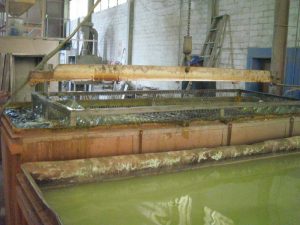Chemical cleaning is the process of removing fouling deposits from process equipment using chemical solutions. The cleaning action may be entirely chemical in function, such as mineral acids used to degrade inorganic salt scales, or may be assisted by physical means such as steam or turbulent water flow.
To ascertain the most suitable cleaning agent for a particular application, a representative sample of the fouling deposit should be investigated in a laboratory of skilled professionals who specialize in evaluating petroleum processing or chemical manufacturing foulants. Understanding the process can be critical in quickly knowing the nature of debris and also in selecting the appropriate products for application in successful removal.
The benefits of chemical cleaning
- Cleaning can be done without dismantling the equipment
- Cleaning is more effective as all parts will be reached, resulting in more uniform cleaning
- When properly done, the damage caused by chemical cleaning is minimal and generally less due to conventional mechanical cleaning. Damage induced by mechanical cleaning could enhance corrosion and/or fouling during subsequent operations
- Cleaning is likely to reduce the time required for decontamination by 50% or more returning the equipment to productive operations more quickly than mechanical cleaning methods.
- Cleaning often generates fewer waste materials than mechanical cleaning.
The opportunity to recover large amounts of valuable hydrocarbon streams is accentuated with chemical cleaning and not as likely with conventional cleaning.

